Overview
The article titled "10 Key Insights on Mineral Rights in Title Services" underscores the critical role and implications of mineral rights within the realm of title services. It asserts that a thorough grasp of mineral rights is essential for title researchers, as these rights can profoundly influence property value and ownership claims. This necessitates meticulous documentation to prevent future disputes, reinforcing the need for accuracy in title research.
Introduction
Understanding mineral rights is crucial in the realm of title services; these rights can significantly impact property ownership and asset value. This article delves into key insights surrounding mineral rights, underscoring their importance in real estate transactions and the complexities that title researchers encounter. Furthermore, with the integration of advanced technologies like machine learning, the landscape of title research is evolving. Yet, challenges remain. How can professionals navigate these intricacies to ensure accurate and compliant title services in an increasingly automated world?
Parse AI: Streamlining Title Research with Machine Learning
Parse AI harnesses the power of machine learning and optical character recognition (OCR) to revolutionize the extraction of essential information from document titles. This cutting-edge technology significantly reduces the time required for ownership research, enabling professionals to dedicate their efforts to more complex tasks. By optimizing the research workflow, Parse AI not only enhances accuracy but also boosts overall efficiency, leading to substantial cost savings for property analysts and facilitating smoother real estate transactions.
Furthermore, with the OCR market projected to reach 39.7 billion USD by 2030, real estate professionals assert that automation through OCR is not merely a trend but a necessity for maintaining competitiveness in a fast-paced market.
"Integrating OCR technology has transformed our workflow, allowing us to focus on strategic decisions rather than routine tasks," observes a leading expert, underscoring the vital role of technology in modern property services.
Nevertheless, challenges persist, particularly in accurately converting handwritten text, highlighting the ongoing need for advancements in OCR capabilities.
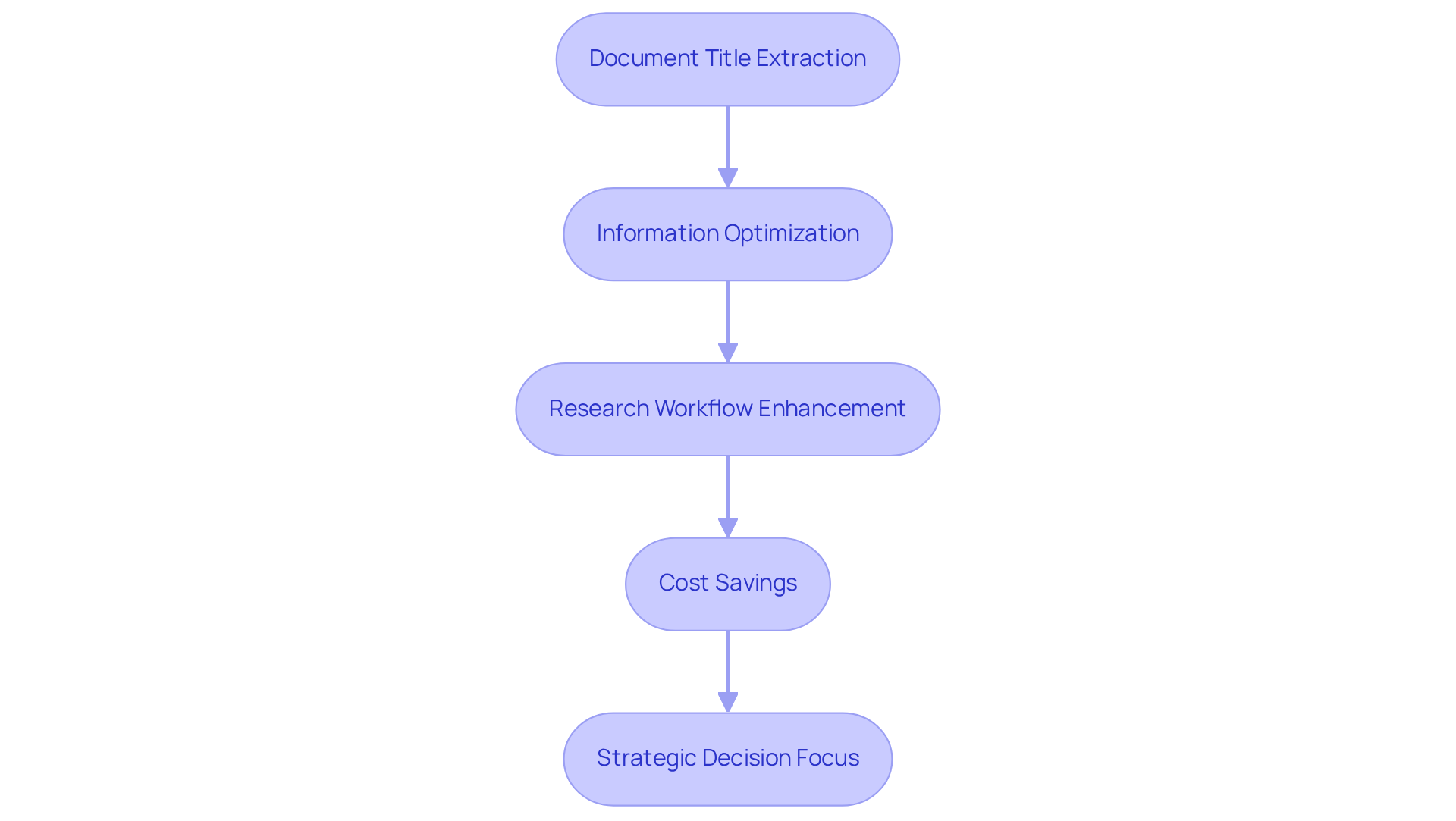
Understanding Mineral Rights: Essential Concepts for Title Services
The overview of mineral rights in title services highlights that mineral rights represent the ownership of minerals located beneath a land's surface, establishing them as a pivotal concern for title researchers. These rights can profoundly influence asset value and ownership claims, necessitating a comprehensive understanding of their implications.
Title services must provide an overview of mineral rights in title services, ensuring that these rights are explicitly defined in land deeds and that any transfers are meticulously documented. This diligence is critical to avert future disputes; unclear or improperly recorded mineral rights can result in costly legal challenges.
For instance, Louisiana's 'prescription of nonuse' rule stipulates that mineral rights revert to the surface owner after ten years of non-use, underscoring the complexities tied to mineral rights ownership. Furthermore, researchers focused on ownership emphasize that the value of real estate can be dramatically swayed by the presence or absence of mineral rights. These rights can provide landowners with potential revenue through royalties, typically ranging from 12.5% to 25%, and leasing agreements.
As Vernon Henry, a landman and mineral rights expert, asserts, "mineral rights are separate from surface rights and may not transfer with your land deed." These services offer an overview of mineral rights in title services by effectively managing mineral rights documentation, which plays an essential role in safeguarding asset interests and ensuring seamless transactions.
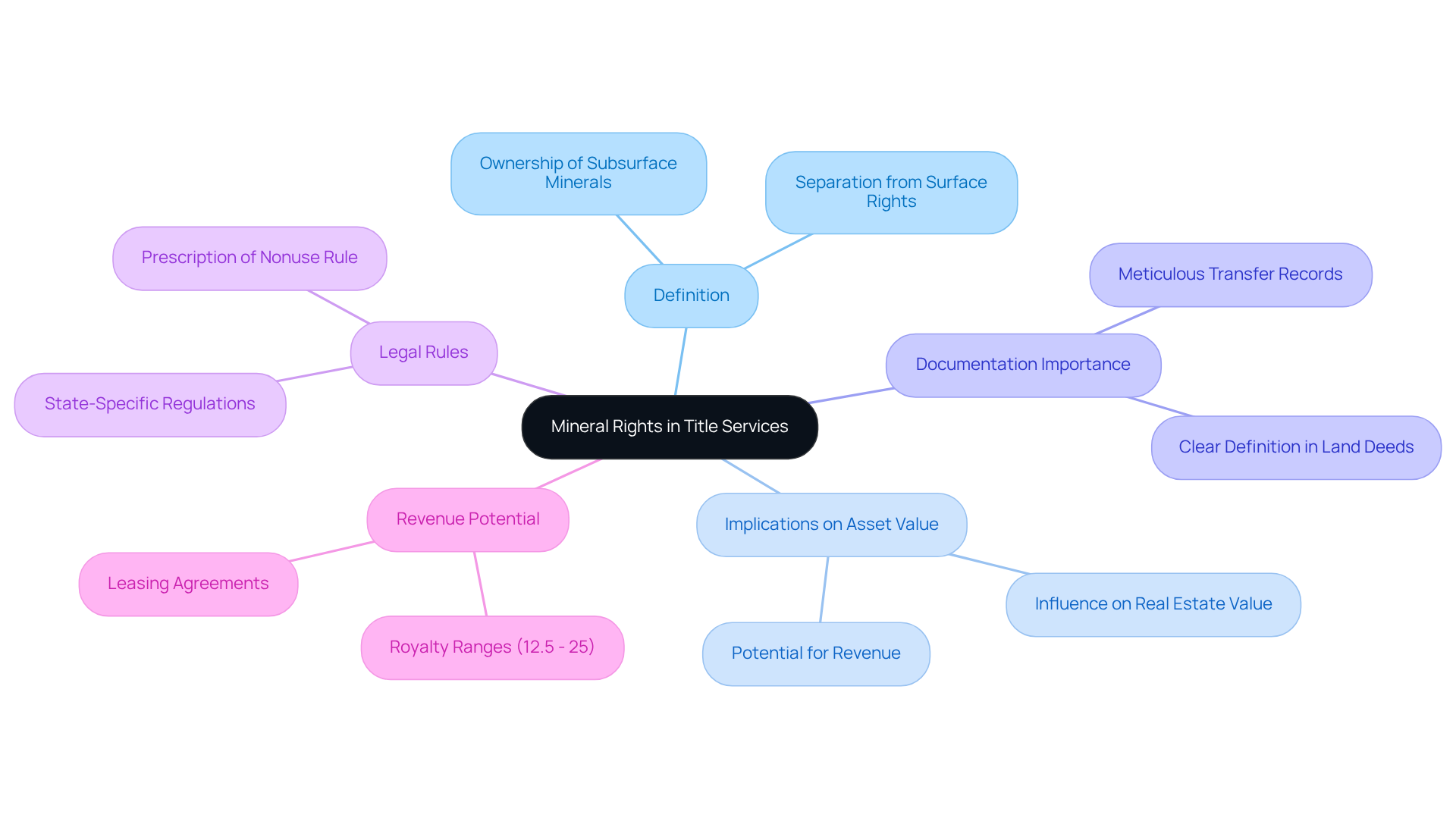
Title Research Process: Key Steps for Accurate Verification
The investigation process is essential for establishing clear and sellable ownership records, encompassing several critical steps:
- Identifying the asset
- Collecting relevant materials
- Examining public records
- Confirming ownership
Each of these steps plays a pivotal role in minimizing errors and ensuring compliance with legal standards. Statistics indicate that inaccuracies in ownership research can lead to significant financial repercussions, with studies revealing that up to 25% of ownership searches may contain errors that could affect claims of ownership. As industry specialists assert, "A real estate ownership search records the chain of possession on a piece of real estate," underscoring the importance of diligence in this process.
Furthermore, adopting organized strategies, such as utilizing checklists and software tools, can enhance the accuracy and efficiency of title research. By adhering to a structured approach, researchers can adeptly navigate complexities and mitigate potential disputes, ultimately reinforcing the integrity of transactions.
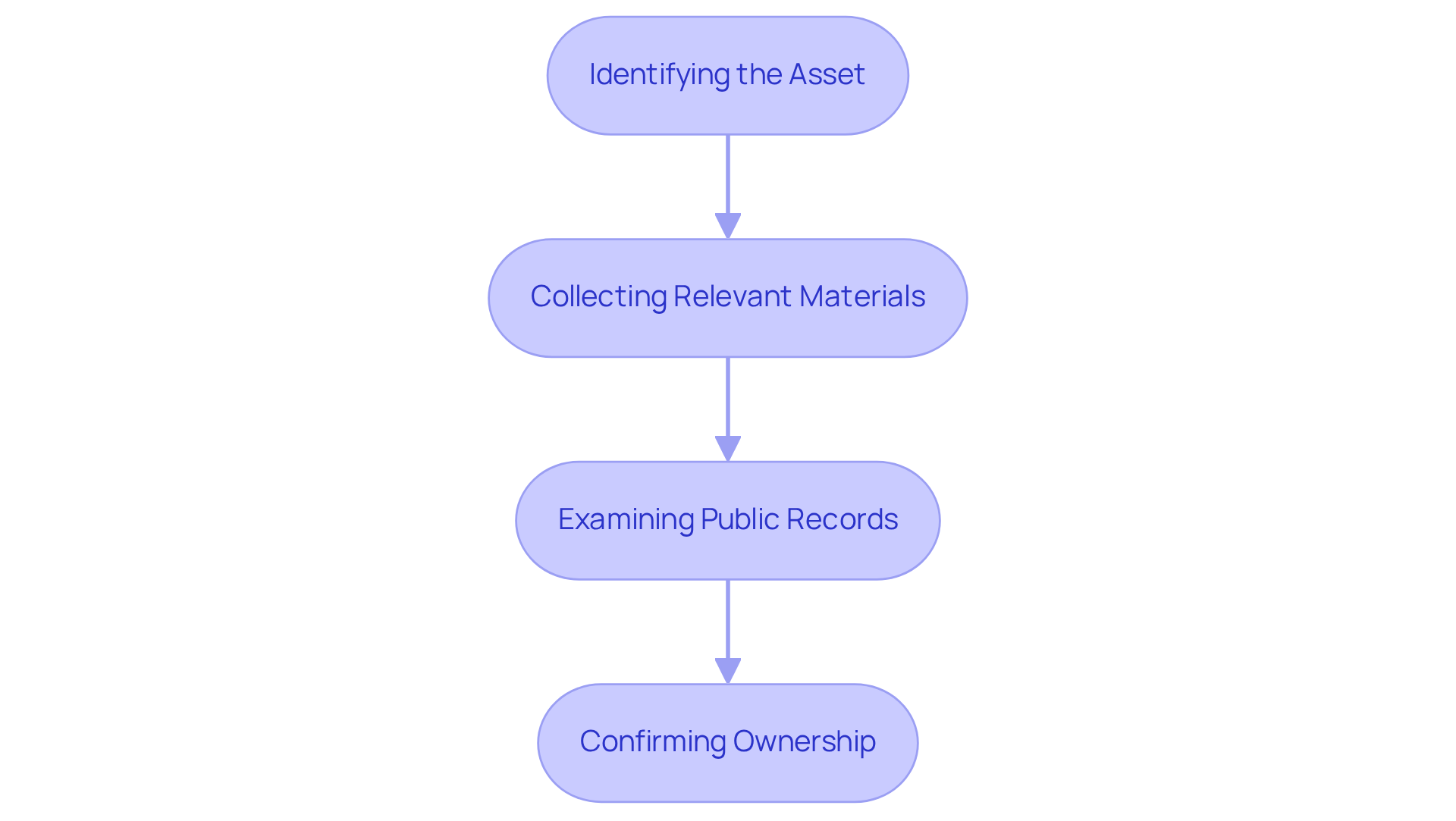
Gathering Property Information: Best Practices for Title Researchers
Effective research on property fundamentally relies on the strategic utilization of reliable sources, with county records serving as a cornerstone for information gathering. Parse AI enhances this process by providing advanced machine learning tools that expedite the processing and interpretation of files. Their platform empowers document analysts to conduct full-text searches and efficiently retrieve essential information from ownership documents, thereby simplifying the verification process.
These records, complemented by tax evaluations and previous ownership reports, deliver critical insights that clarify possession and encumbrances. Scholars must prioritize the maintenance of well-organized records of their findings, which not only streamlines access and evaluation but also bolsters the overall effectiveness of the verification process.
By implementing robust data collection strategies—such as regularly updating records and leveraging well-curated datasets—researchers can significantly enhance the precision of their assessments. Adopting these best practices ensures that all relevant information is meticulously considered, ultimately leading to more accurate and dependable evaluations.
Given that the U.S. real estate market is projected to reach a valuation of USD 155 billion by 2029, the importance of meticulous data management in ownership research is paramount.
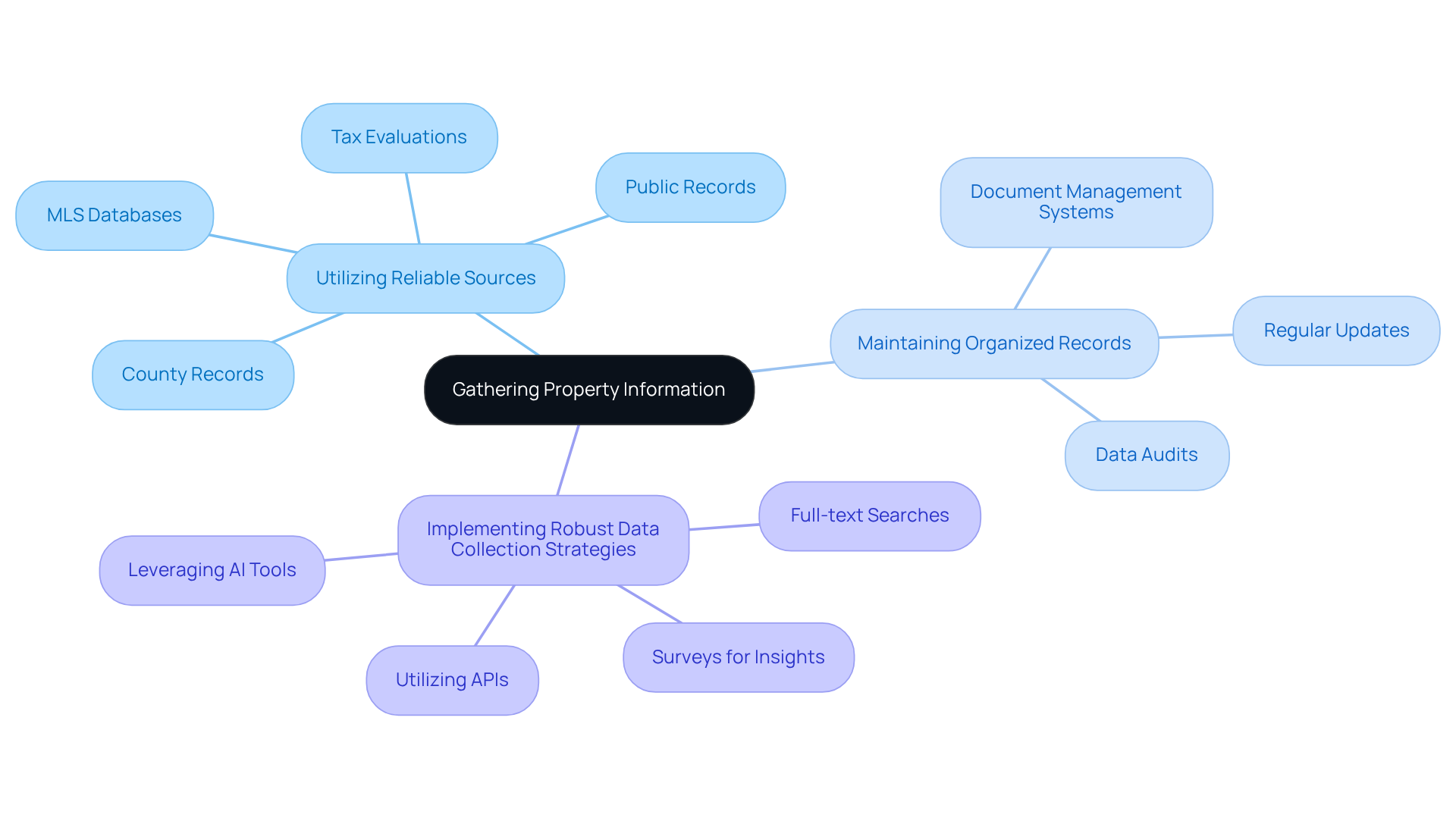
Searching Public Records: A Cornerstone of Title Research
Exploring public records stands as a fundamental aspect of ownership research, encompassing essential documents such as real estate deeds, tax assessments, mortgage documents, and court filings. These records are crucial for determining ownership history and recognizing any encumbrances that may impact a real estate's ownership. Common issues encountered during these searches include:
- Unpaid real estate taxes
- Outstanding liens
- Legal claims
These issues can significantly affect ownership rights. A recent analysis revealed that nearly 30% of property searches uncover unresolved debts linked to assets, emphasizing the importance of thorough investigations. Furthermore, conducting a property search can save considerable time and money over time, making it an essential step for potential buyers and lenders alike.
Recent modifications in public record accessibility have enhanced the efficiency of ownership research. Numerous regions now provide online databases, enabling document investigators to obtain essential information more quickly than conventional techniques. However, challenges remain, as some records may still be difficult to obtain or contain errors that complicate the verification process. As one investigator pointed out, 'Navigating public records can feel like searching for a needle in a haystack, particularly when dealing with outdated or incomplete information.' This highlights the importance of diligence, as errors in public records can lead to significant complications.
Successful research of names often relies on comprehending the kinds of public records crucial for verification. By utilizing resources such as:
- Tax assessments
- Mortgage documents
- Court judgments
Researchers can ensure a thorough review of a real estate's history. Furthermore, obtaining title insurance is crucial as it protects against financial losses from undiscovered title defects, ultimately safeguarding the interests of buyers and lenders alike.
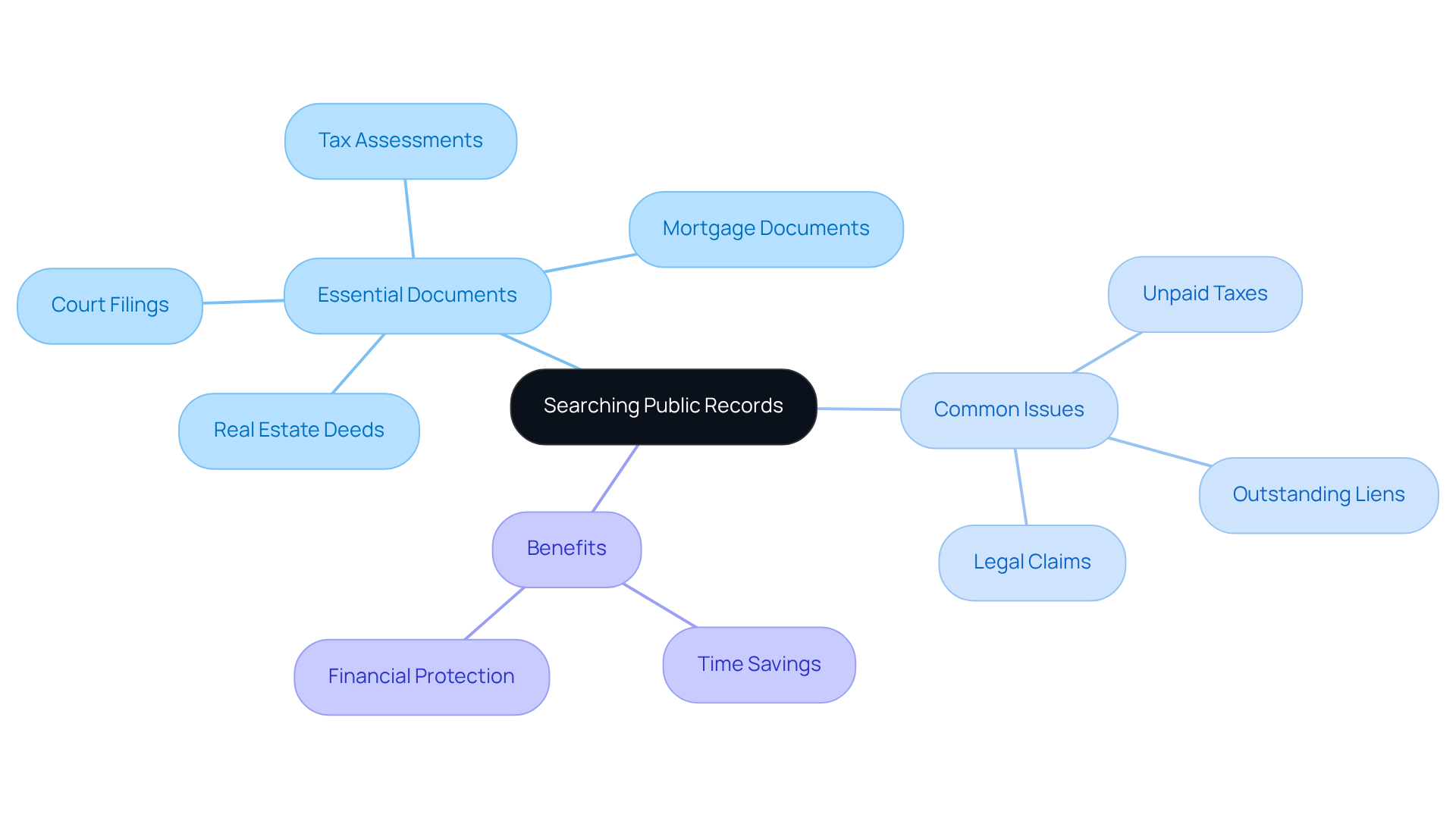
Examining Deeds and Contracts: Ensuring Legal Validity
A thorough examination of deeds and contracts is essential for confirming the legal validity of asset ownership. Title researchers must meticulously verify that all records are properly executed, accurately recorded, and devoid of errors. This process includes checking signatures, dates, and any applicable conditions or restrictions associated with the property. Legal experts emphasize that ensuring the integrity of these documents is crucial to preventing future ownership disputes.
As Stacy O. Kalmanson observes, 'A harmless mistake will not hinder the transfer of ownership or the legal recording of the document and may be disregarded entirely.' Common pitfalls in real estate contracts, such as overlooked signatures or incorrect dates, can lead to significant complications. By adopting rigorous verification practices, researchers can mitigate these risks and enhance the reliability of real estate transactions.
Successful instances of legal verification in real estate show that diligence in this area not only protects ownership rights but also promotes trust among stakeholders in the real estate market. Moreover, cases such as Dolan v. City of Tigard demonstrate the real-world consequences of ensuring legal validity in ownership documents, emphasizing the importance of diligent document execution in ownership research.
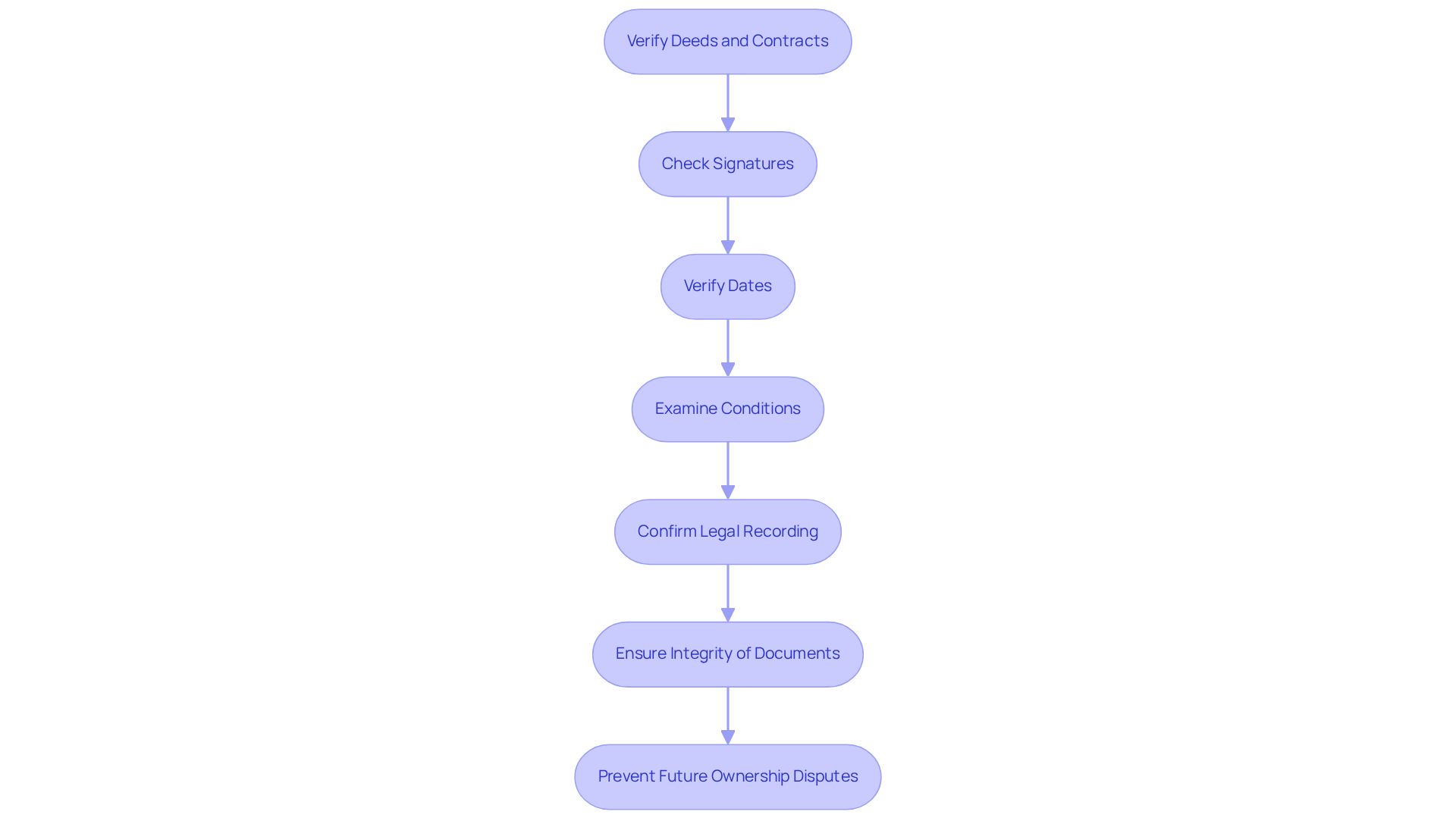
Investigating Liens and Encumbrances: Avoiding Ownership Disputes
A thorough investigation of liens and encumbrances is essential for preventing ownership disputes in real estate transactions. Title specialists must diligently identify any outstanding debts or claims against a property, including mortgages, tax liens, and easements. For instance, mechanic's liens can arise when contractors are unpaid, while tax liens are imposed by government agencies for unpaid taxes. These encumbrances can significantly impact the legitimacy of a property and may lead to foreclosure if payments are defaulted, resulting in legal complications if not addressed promptly.
By identifying these issues early in the research process, researchers can effectively advise clients on potential risks and the necessary steps to resolve ownership concerns. This proactive approach not only safeguards the interests of buyers and sellers but also enhances the overall efficiency of the transaction. As Sidney Richardson observed, 'Purchasing a home is probably one of the largest investments you’ll ever undertake, so it’s essential to comprehend any and all legal interests and restrictions on what you or other parties can do with your asset.'
Ultimately, a thorough lien investigation is a crucial element of ownership services, as it provides an overview of mineral rights in title services and reinforces the integrity of property transactions. It is important to note that almost every home in the country has at least some kind of encumbrance, highlighting the necessity for thorough investigations.
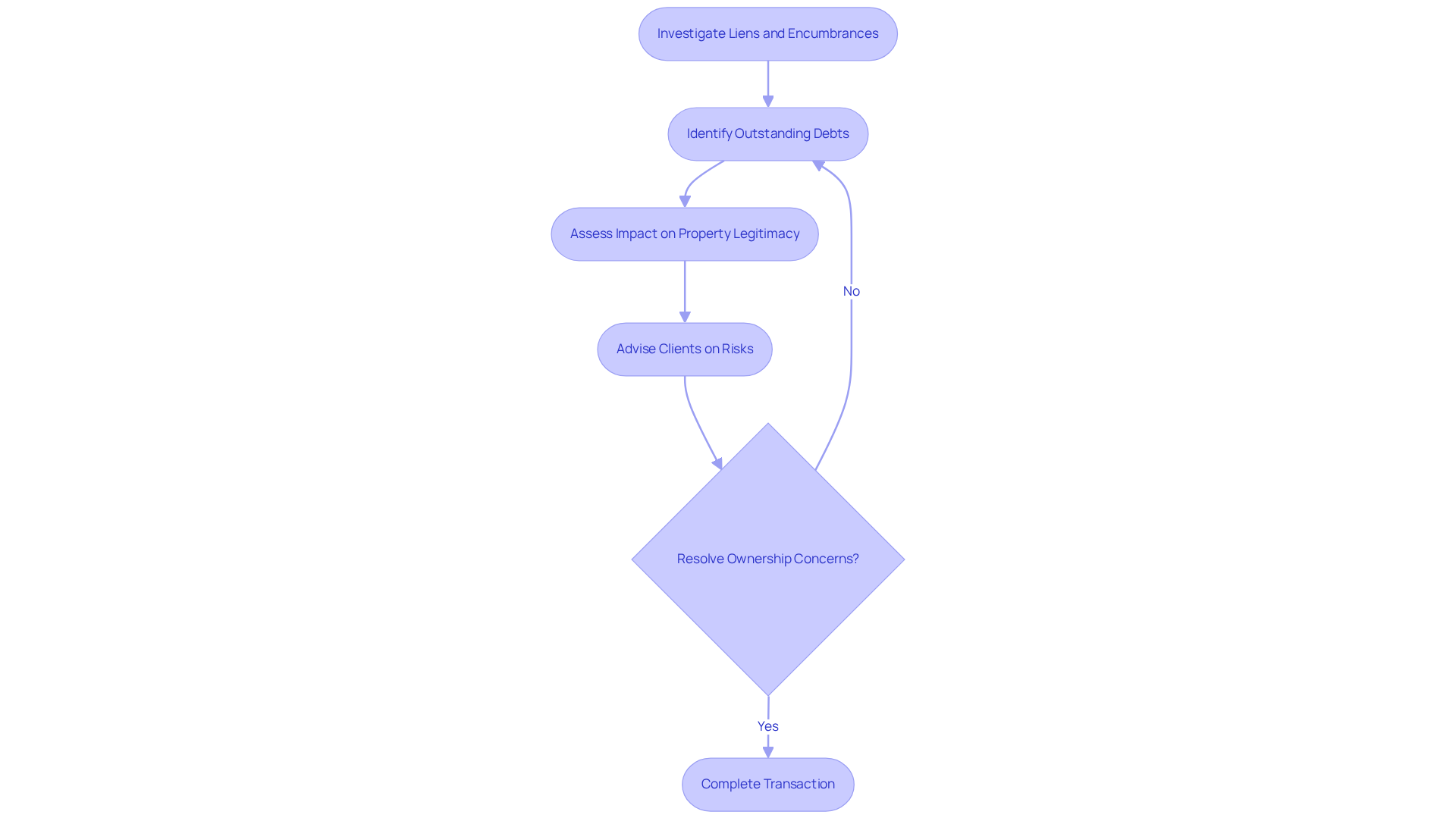
Verifying Ownership: Confirming Title Accuracy
Confirming ownership necessitates a meticulous cross-referencing of various information sources to ensure the accuracy of ownership rights. Title specialists are required to compare data from public records, deeds, and other pertinent documents to identify any inconsistencies. This comprehensive verification process is crucial in preventing potential legal complications, safeguarding buyers' interests, and empowering them to proceed with their transactions confidently.
Successful instances of cross-referencing have illustrated its effectiveness in uncovering discrepancies, such as ownership disputes or unrecorded liens, which could otherwise jeopardize a sale. Insights from seasoned professionals underscore the importance of this diligence, as it not only protects buyers but also enhances the overall integrity of property transactions.
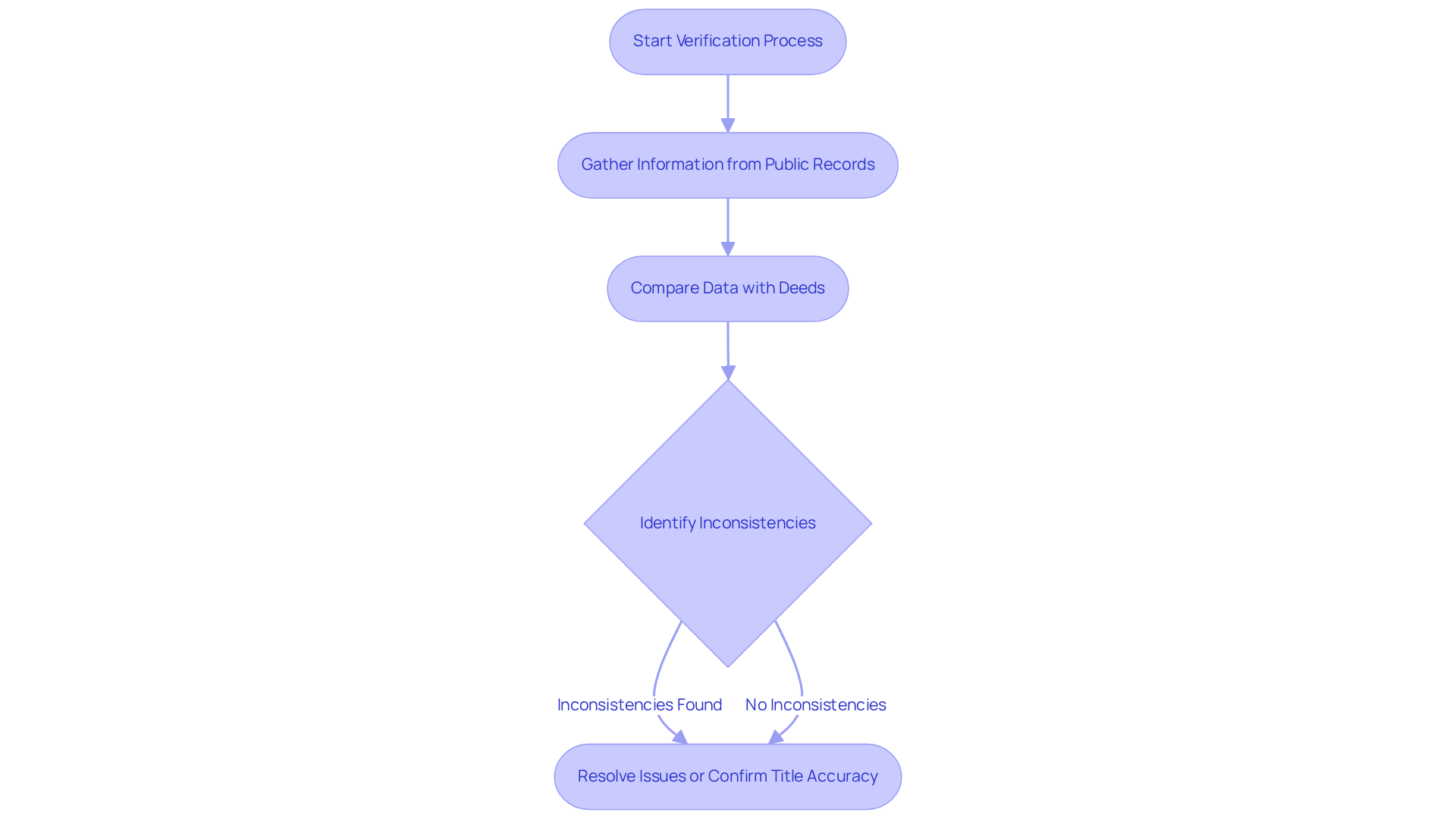
Common Challenges in Title Research: Navigating Complexities
Accurate title research is crucial in navigating the complexities of document analysis. Common challenges in this field include:
- Incomplete records
- Discrepancies in ownership information
- The presence of complex legal language
Title analysts must be equipped to tackle these issues effectively, employing critical thinking and problem-solving skills. Furthermore, utilizing advanced technology, such as Parse AI's sophisticated machine learning tools, can significantly streamline the research process. With features like:
- Automated file processing
- Full-text search
- Machine learning extraction
Parse AI alleviates these challenges. Consequently, professionals can finalize abstracts and reports more swiftly and accurately.
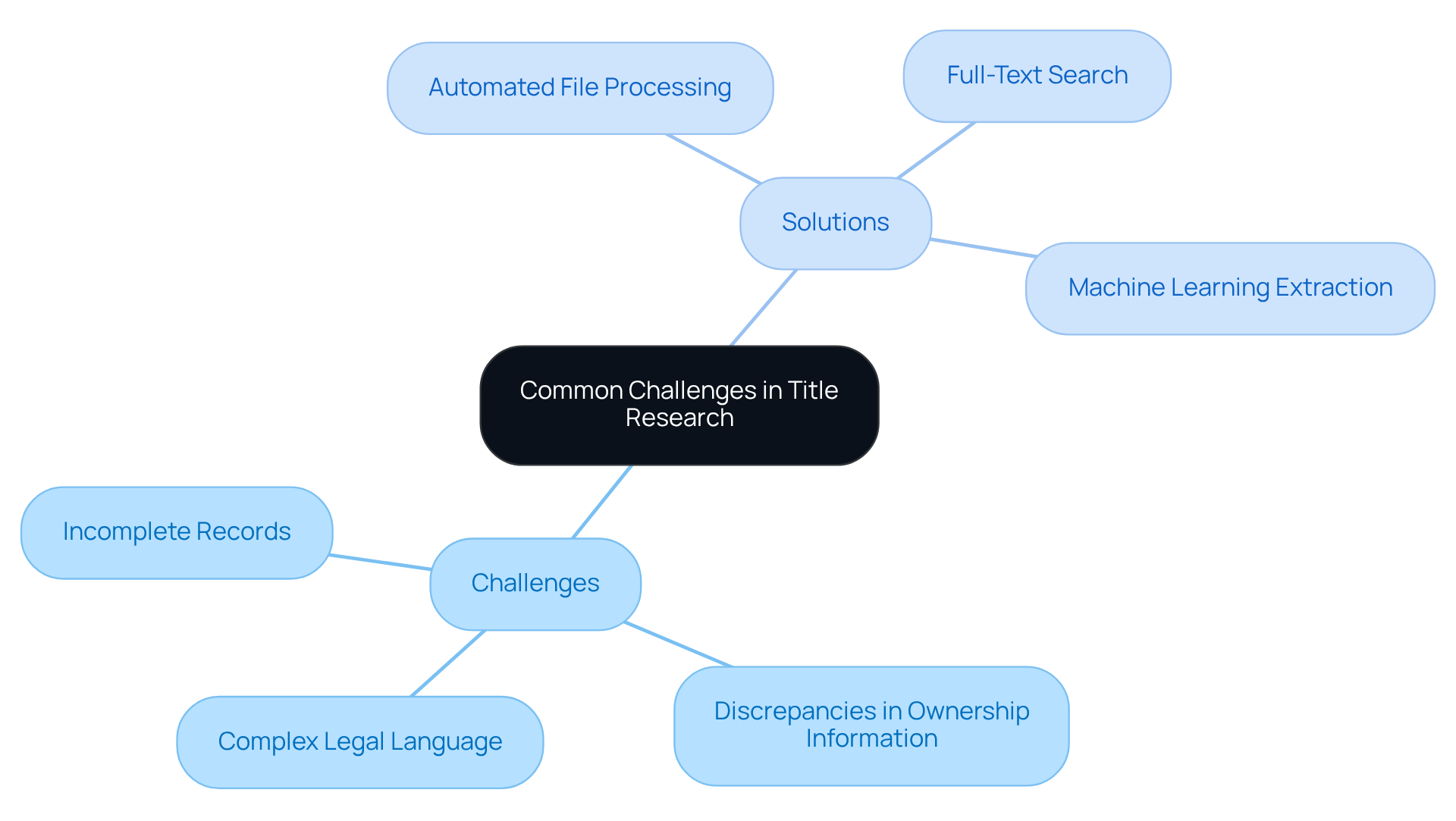
The Role of Legal Experts in Title Research: Ensuring Compliance and Accuracy
Legal experts play a vital role in ownership research, ensuring adherence to relevant laws and regulations. Their expertise aids in deciphering intricate legal texts and assists researchers in managing potential legal challenges.
Furthermore, by leveraging advanced machine learning tools from Parse AI, including the example manager for efficient annotation and information extraction, legal professionals can enhance the accuracy and reliability of property ownership research. Parse AI's capabilities in automated document processing and title research automation facilitate quicker and more precise extraction of critical information from title documents.
Consequently, this collaboration safeguards the interests of all parties involved in real estate transactions, ensuring that legal compliance is upheld throughout the process. As one legal professional aptly noted, 'Good lawyers know the law. Great lawyers know the judge,' highlighting the necessity of informed legal guidance in navigating the complexities of real estate transactions.
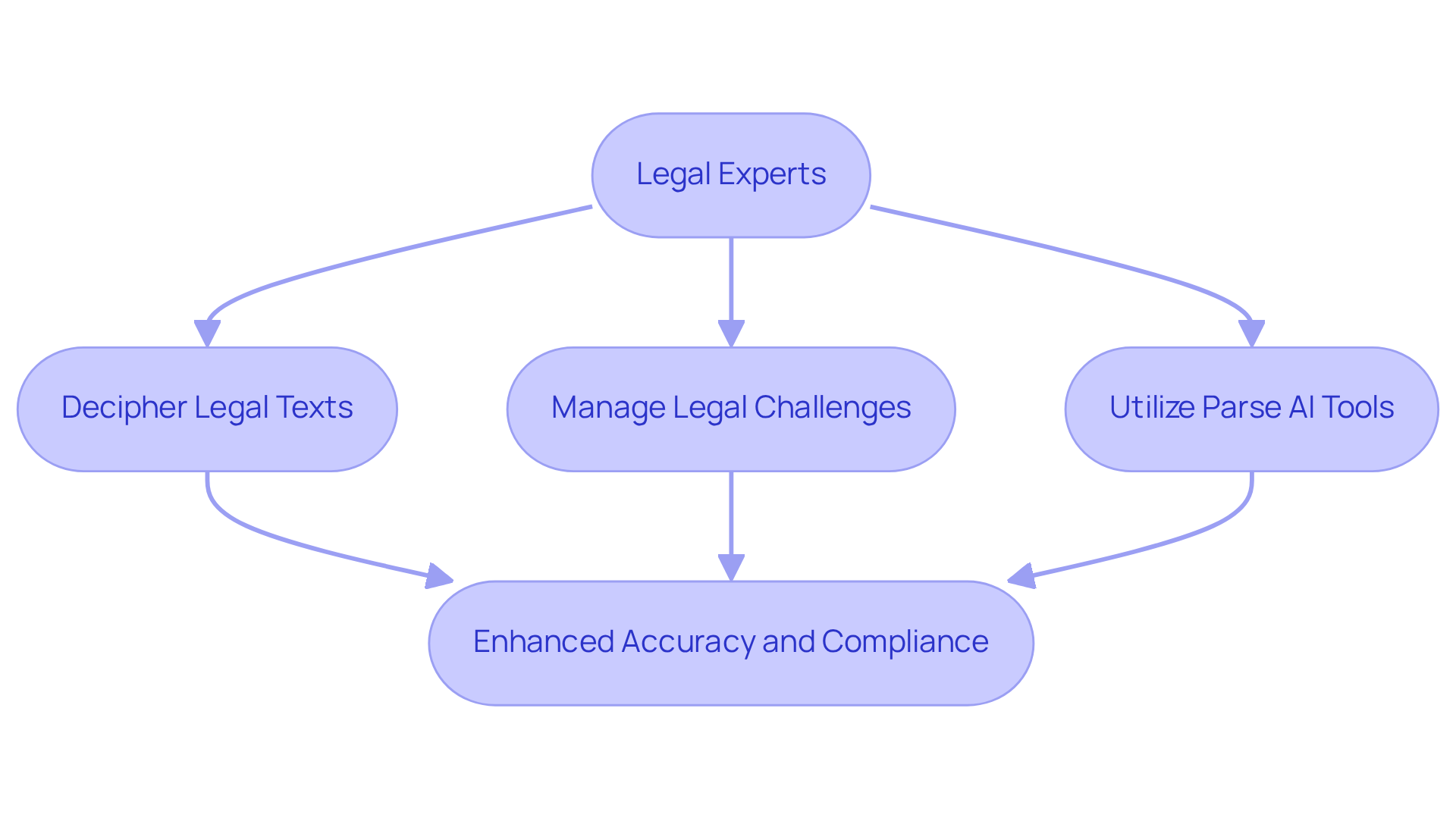
Conclusion
The exploration of mineral rights within title services underscores their critical importance in determining ownership and asset value in real estate transactions. Understanding these rights is essential for title researchers, as they significantly influence property transactions and legal outcomes. By integrating advanced technologies like machine learning and OCR, professionals can enhance the efficiency and accuracy of title research, ensuring that all aspects of mineral rights are meticulously addressed.
Key insights from the article highlight the necessity of thorough title research processes, including the examination of deeds, public records, and the investigation of liens and encumbrances. Each step in this process is vital to safeguarding ownership rights and preventing disputes, reinforcing the need for diligence and attention to detail in property transactions. Furthermore, the collaboration between technology and legal expertise plays a pivotal role in navigating the complexities of title research, ultimately fostering trust and reliability in the real estate market.
In light of these findings, it is imperative for real estate professionals to prioritize the integration of innovative tools and best practices in their title research efforts. By doing so, they can not only enhance their operational efficiency but also protect the interests of all parties involved in real estate transactions. Embracing these insights and technologies will pave the way for more secure and successful property dealings in the future.
Frequently Asked Questions
What is Parse AI and how does it benefit title research?
Parse AI utilizes machine learning and optical character recognition (OCR) to streamline the extraction of information from document titles, significantly reducing the time needed for ownership research. This allows professionals to focus on more complex tasks, enhances accuracy, boosts efficiency, and leads to cost savings for property analysts.
Why is OCR technology important for real estate professionals?
The OCR market is expected to reach 39.7 billion USD by 2030, and real estate professionals view automation through OCR as essential for maintaining competitiveness in a fast-paced market.
What challenges does OCR technology currently face?
One of the main challenges is the accurate conversion of handwritten text, highlighting the need for ongoing advancements in OCR capabilities.
What are mineral rights in the context of title services?
Mineral rights refer to the ownership of minerals located beneath the surface of a land, which can significantly impact asset value and ownership claims. Understanding these rights is crucial for title researchers.
Why is it important to clearly define mineral rights in land deeds?
Clearly defined mineral rights in land deeds and meticulously documented transfers are essential to prevent future disputes and costly legal challenges that can arise from unclear or improperly recorded rights.
How can mineral rights affect real estate value?
The presence or absence of mineral rights can dramatically influence the value of real estate, as these rights can provide potential revenue through royalties and leasing agreements, typically ranging from 12.5% to 25%.
What are the key steps in the title research process?
The key steps in the title research process include identifying the asset, collecting relevant materials, examining public records, and confirming ownership.
Why is accuracy in ownership research important?
Accuracy in ownership research is critical as inaccuracies can lead to significant financial repercussions, with studies indicating that up to 25% of ownership searches may contain errors affecting claims of ownership.
What strategies can enhance the accuracy and efficiency of title research?
Adopting organized strategies, such as utilizing checklists and software tools, can improve the accuracy and efficiency of title research, helping researchers navigate complexities and reduce potential disputes.




